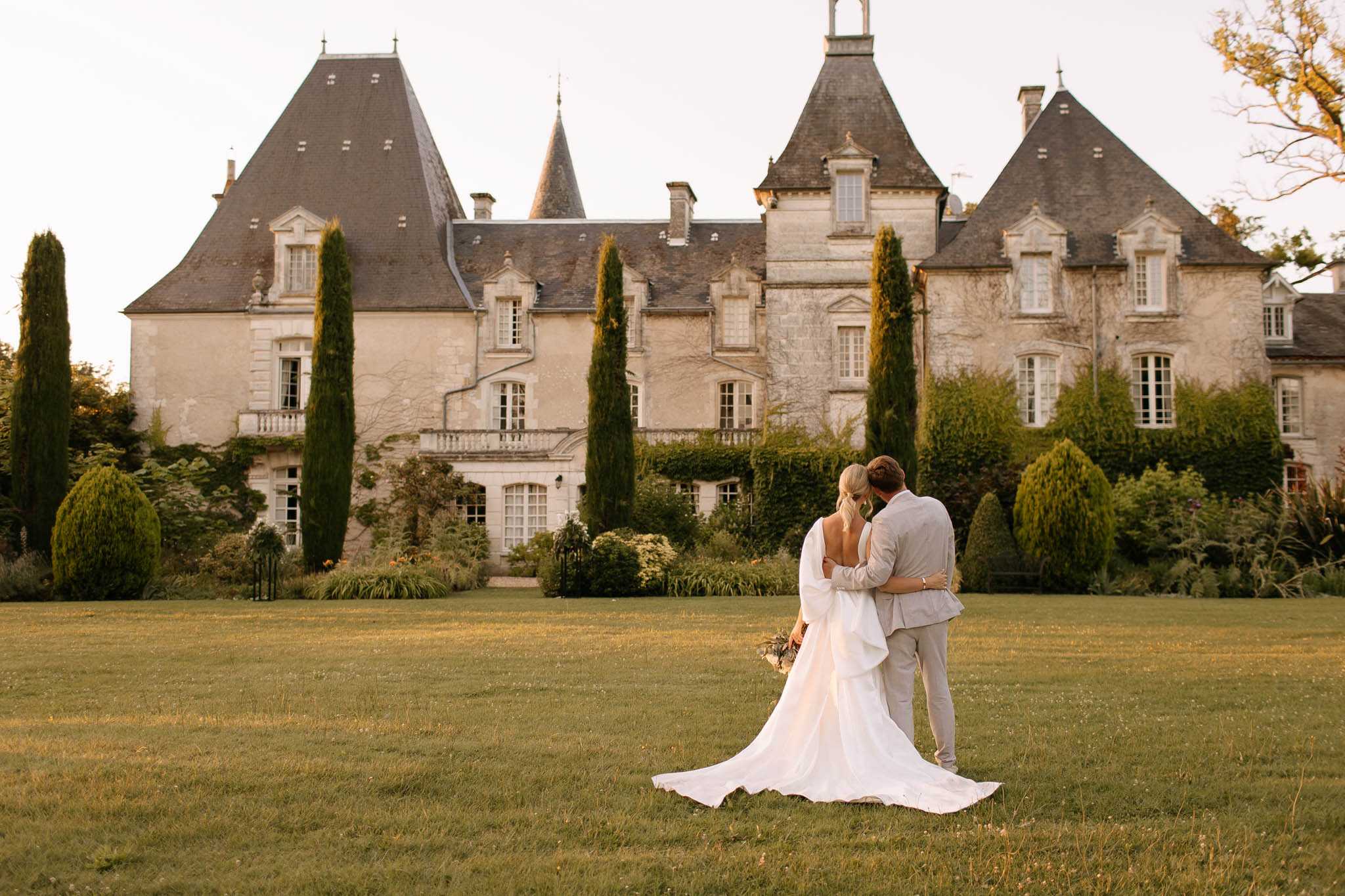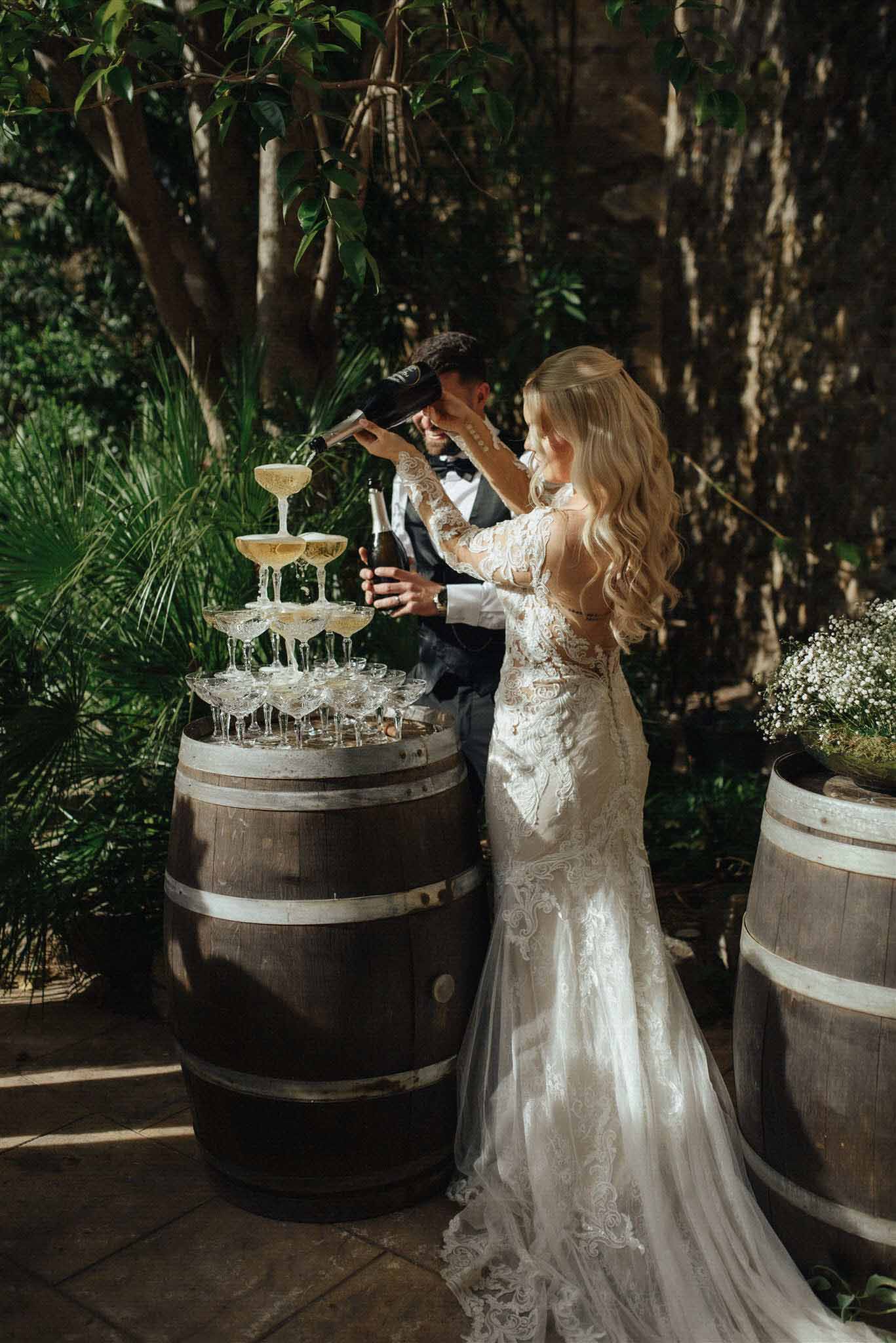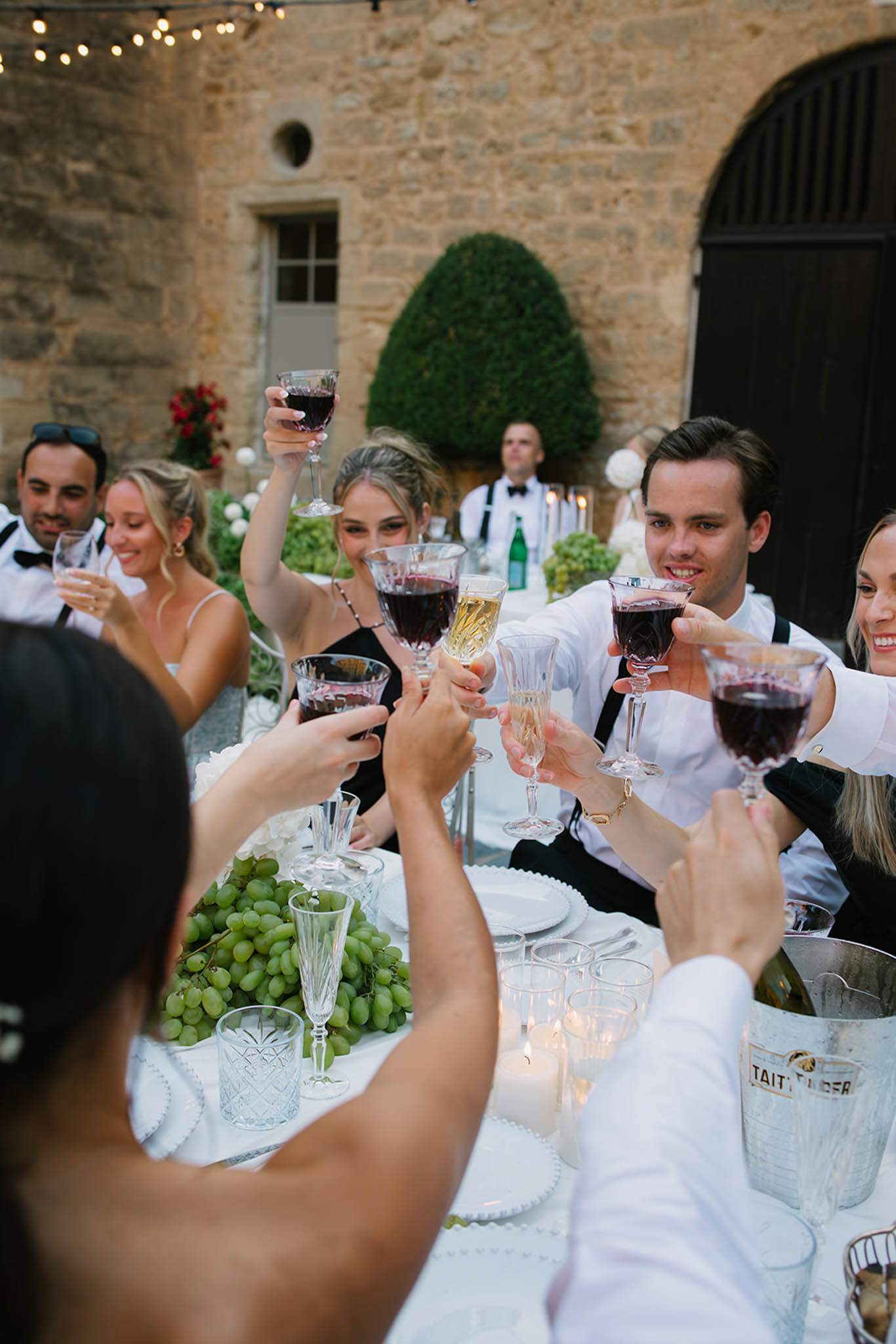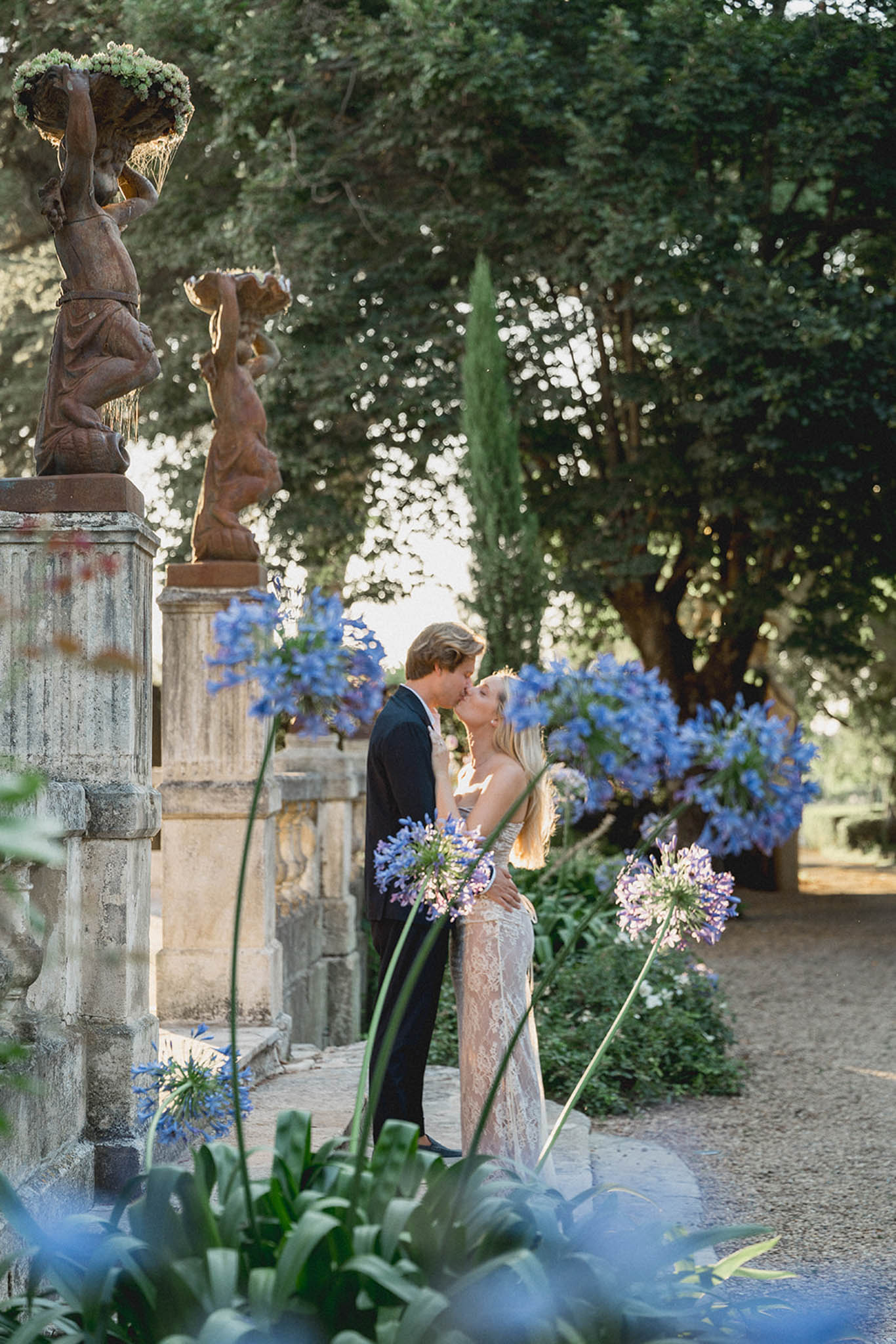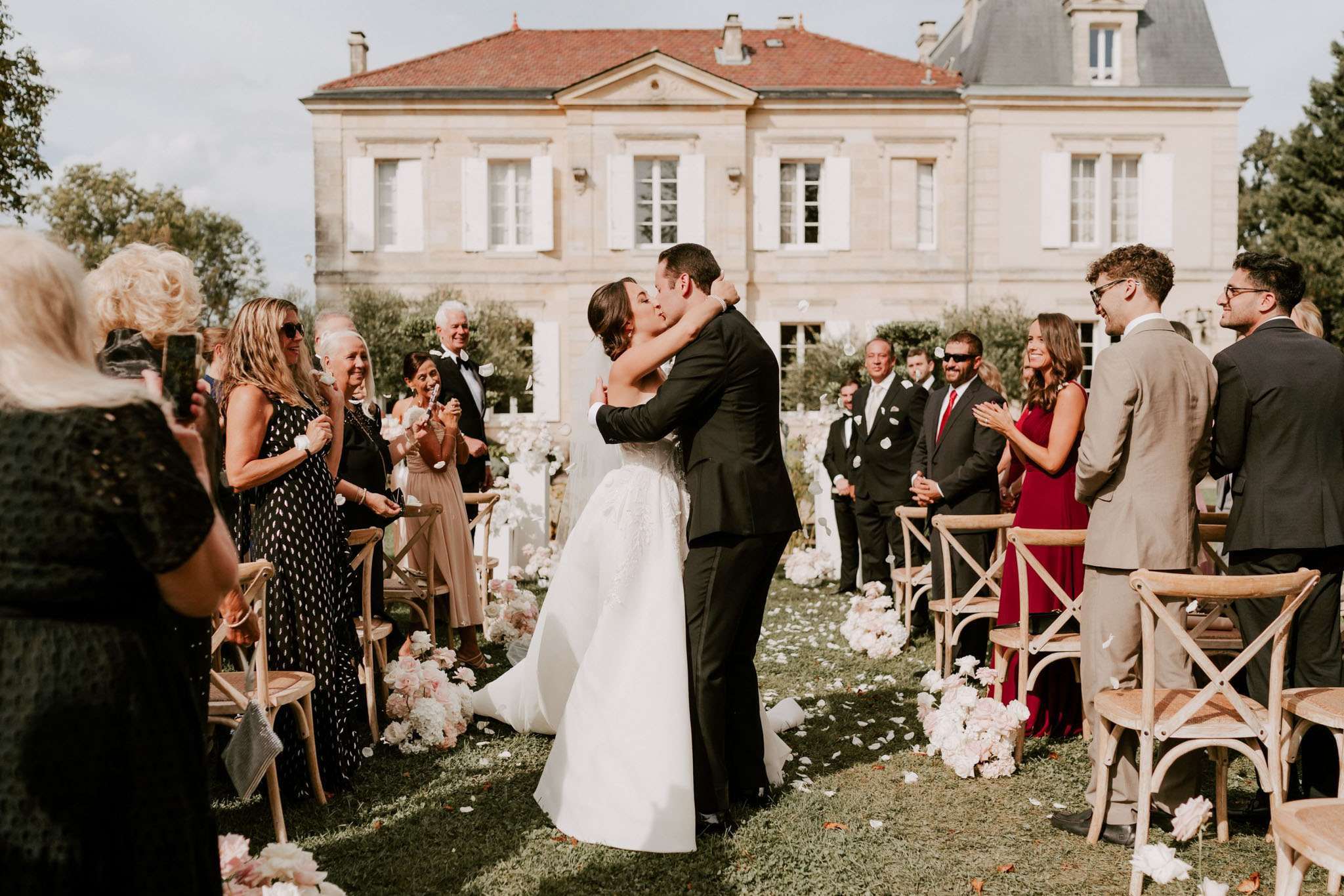A Comprehensive Guide to Getting Married in France
Firstly, congratulations on your engagement, and welcome to the incredible adventure of planning your wedding! Planning a wedding in France, with its beautiful scenery, delicious food, and warm weather, is a dream come true for many. What’s not to love? It’s an exciting journey that, when done right, becomes the trip of a lifetime for both you and all your guests. However, organizing a wedding in France can be a substantial undertaking, and it’s important to have a clear understanding of what you’re diving into. Embracing this experience can make your wedding truly unforgettable, blending the charm and romance of France into your special day.
Going to France is a beautiful and culturally rich experience that blends tradition with romance. From its breathtaking landscapes to its 1000 castles, the most visited country in the world offers a unique backdrop for couples looking to tie the knot. Here are ten important questions to consider when getting married in France.
When Should I Start Planning my Destination Wedding in France?
18 months is a perfect time to start planning your wedding. You’ll get a good range of suppliers available and better prices (before they increase the following year). France is very popular and some venues and suppliers get booked two years in advance. Having said this, you can also do it in a few months, though options may be more limited and the process a bit more intense…

How Much Does it Cost to Get Married in France?
The cost of a wedding in France can vary significantly based on various factors such as location, guest count, and preferences. On average, however, a wedding in France can range from €30,000 to €90,000 or more for a luxury wedding. Provence, the French Riviera and Paris tend to be more expensive due to higher venue and vendor costs. Number of guests, venue rentals, catering, and entertainment and the design can make up a significant portion of the budget.
Couples looking for more luxury affairs with extensive guest lists, high-end venues, and elaborate decorations can easily surpass the average range. Conversely, those aiming for smaller, intimate celebrations such as an elopement or an intimate wedding in less expensive locales may find ways to keep costs lower. To achieve a dream wedding while staying within budget, careful planning, prioritization, and researching cost-effective options are essential.
Budgeting for a Destination Wedding in France: From Mid-Range to Luxury
Here’s a breakdown of what you can expect to spend* on average for 100 guests in the South of France (covering the extended area from Southwest to Southeast) for two-night accommodations, approved by wedding planner Candice from Quinze Heures Quinze:
*Please note, this is not a complete wedding budget list. It covers major areas but does not include other potential costs.
Mid-Range Wedding (€30,000 – €60,000)
- Venue & Accommodation: €8,000 – €12,000 for a picturesque old stone manor house or boutique hotel.
- Planning: €1,500 – €5,000 for a mid-range wedding planner, offering services from day-of coordination to full wedding planning.
- Catering & Beverages: €10,000 – €15,000 for a three-course meal and local wines.
- Décor & Flowers: €4,000 – €7,000 for elegant decorations.
- Photography & Videography: €5,000 – €7,000 for professional coverage.
High-End Wedding (€60,000 – €90,000)
- Venue & Accommodation: €12,000 – €25,000 for a charming estate in regions like the Riviera or Provence.
- Planning: €6,000 – €10,000 for the help of a high-end wedding planner for a full wedding planning service.
- Catering & Beverages: €15,000 – €20,000 for gourmet dining with top-tier wines.
- Décor & Flowers: €8,000 – €15,000 for custom designs and lavish arrangements.
- Photography & Videography: €8,000 – €10,000 for premium services.
Luxury Wedding (€100,000+)
- Venue & Accommodation: €25,000 – €100,000+ for a luxury chateau wedding venue or a five-star hotel.
- Planning: €10,000 – €20,000+ for the help of a luxury wedding planner.
- Catering & Beverages: €30,000 – €50,000 for Michelin-starred chefs and premium drinks.
- Décor & Flowers: €15,000 – €30,000+ for bespoke, opulent designs.
- Photography & Videography €10,000 – €30,000 for world-class photographers and videographers
How to Save Money on Your Wedding in France?
Keep an Open Mind!
If you can’t afford a Chateau in Provence, explore other regions. Occitanie and Nouvelle Aquitaine are perfect alternatives, which will not compromise your vision. Chateau Lacanaud or Domaine de La Vène are perfect examples.
Be flexible with the Date and the Season
Saturdays are prime days as anywhere else. The high season starts mid-June and lasts until the beginning of September, August being the busiest and priciest month. If you choose a venue with accommodation at peak time, you will have to hire it for a week, not just a few days.
It’s important to note that wedding trends are evolving, with more couples now choosing to get married on Fridays or even weekdays. This shift is particularly convenient for destination weddings, as it’s easier for guests to attend during the week when they are likely already on holiday. Saturdays remain as popular as ever, but there’s increasing flexibility in wedding scheduling.
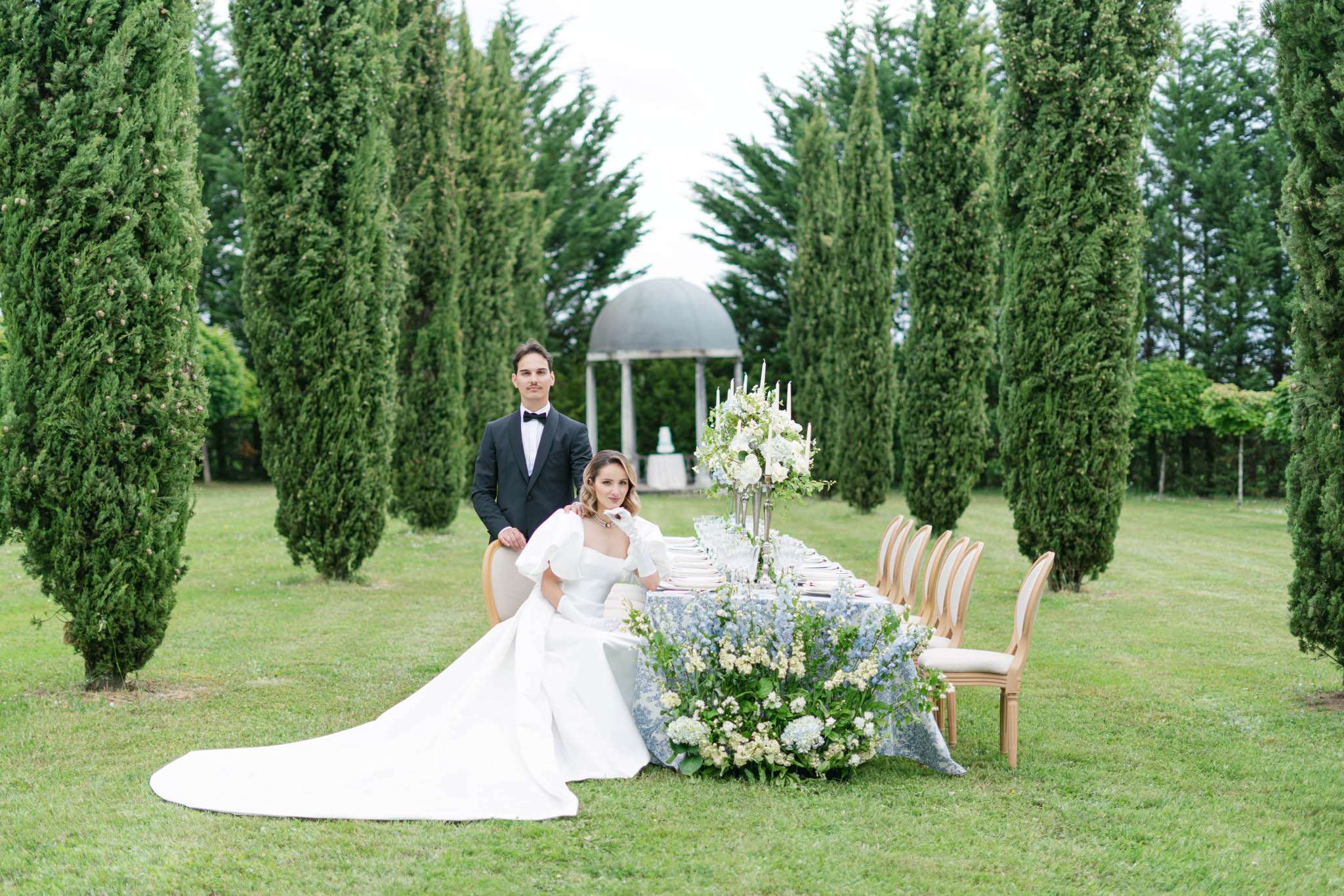
Considerations When Creating Your Destination Wedding Guest List Size
Reduce the number of guests if your mind is set on a particular expensive location or venue. Do not rely on a drop in numbers, because it’s abroad.
Research Destination Costs
Different destinations in France may vary in terms of costs. Research and gather information about the average costs of weddings in your chosen location. Keep in mind that certain regions, such as major cities or popular tourist destinations, may have higher prices compared to rural or less-travelled areas. Consider the currency exchange rates, local taxes, and any additional fees or permits required for hosting a wedding in your chosen destination.
Organising Travel and Transportation
Consider the costs associated with your travel arrangements and transportation within the destination. Research flight prices, baggage fees, and ground transportation options. If you have a large number of guests attending, consider group discounts or transportation arrangements for their convenience.
Should I go for a Fully Inclusive Venue or Source my Suppliers?
When you start searching, you’ll find venues that offer fully inclusive packages covering catering, decorations, and sometimes photographers, celebrants, and more. On the other hand, some venues simply rent out their space, leaving you to organize everything. While sourcing all your suppliers requires more work, it gives you greater control over whom you hire, their style, and their cost. Alternatively, opting for a venue with a fully inclusive package can often be less expensive and more convenient.

What are the Hidden Cost for a Wedding in France?
Don’t Forget to Factor in Exchange Rates & Bank Fees
If you are dealing with a different currency, consider the impact of currency exchange rates on your budget. Account for any potential banking fees or charges associated with international transactions. It may be worth exploring different payment options or discussing potential discounts with vendors for paying in the local currency.
Should I Consider a Contingency Fund
It’s essential to allocate a portion of your budget as a contingency fund to account for any unexpected expenses or last-minute changes. This will provide you with peace of mind and flexibility throughout the planning process.
Do I need Wedding Insurance?
Consider purchasing wedding insurance to protect your investment in case of unforeseen circumstances, such as vendor cancellations, extreme weather conditions, or personal emergencies. Review different insurance options and choose a policy that aligns with your needs and budget.
Vendor Travel and Accommodation
If your vendors need to travel to a remote location or destination, you may need to cover their travel and accommodation expenses. This can apply to photographers, planners, or any vendors who require an overnight stay, especially for multi-day events.
Overtime Costs
Weddings often run longer than expected, and many vendors charge overtime fees for any additional hours worked. Photographers, videographers, and even the venue itself may bill hourly beyond their scheduled time, so it’s helpful to know their rates upfront.
Extra Meals for Vendors
Vendors like photographers, videographers, and coordinators who are present all day will usually expect a meal. This is especially important for destination or full-day events where vendors work extended hours and need sustenance to stay energized.
Unexpected Weather Preparations
If you’re planning an outdoor wedding, it’s wise to have a backup plan for weather. Renting items like tents, fans, heaters, or umbrellas can help ensure your event runs smoothly, but these last-minute preparations can come at a high cost if they’re arranged close to the wedding date.
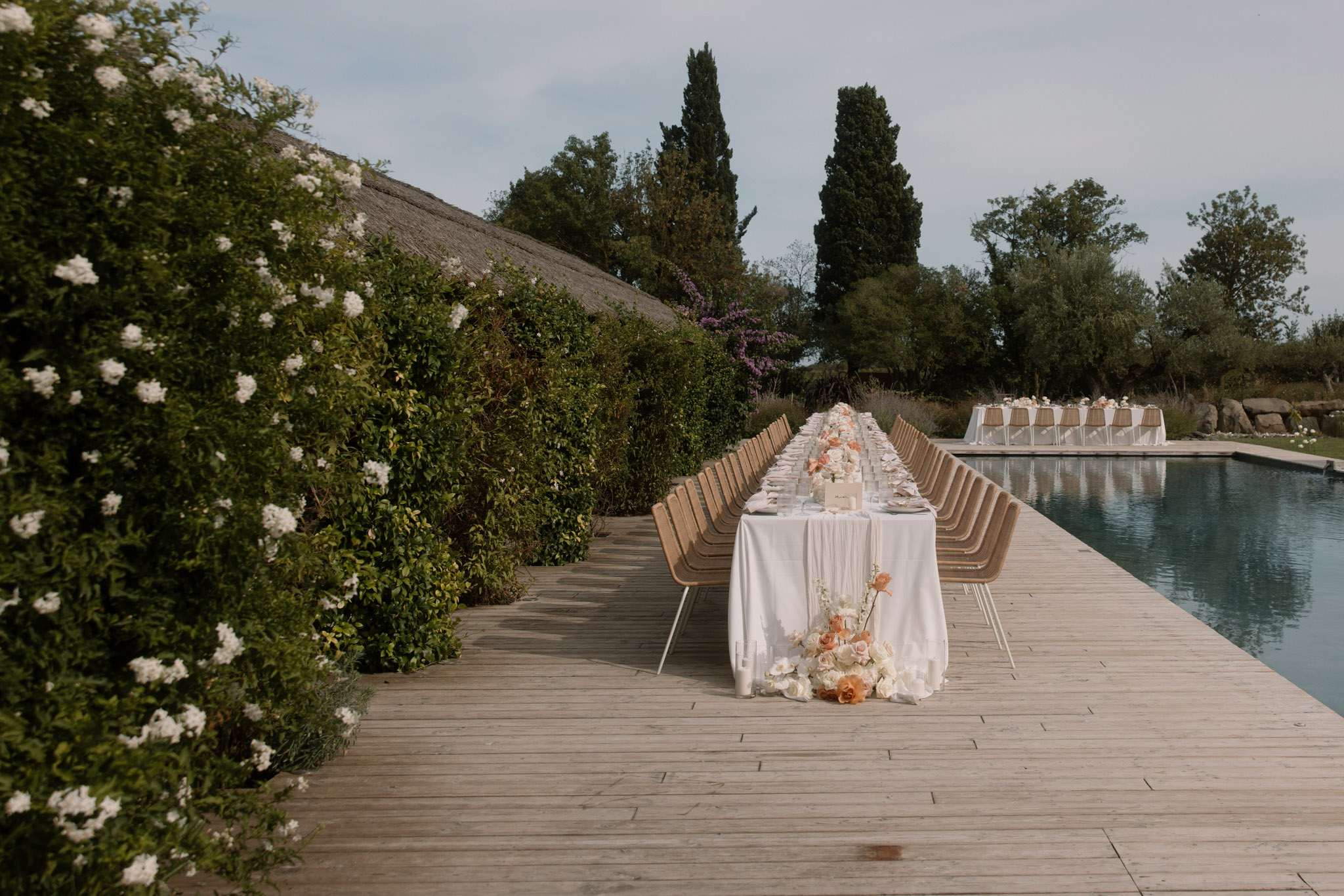
Should I Hire a Wedding Planner for my Wedding in France?
Selecting your Wedding Planner or Coordinator
If all these questions before getting married in France seem a bit overwhelming, it is a good idea to hire a planner from the start. She/he will take you through all these questions to plan your dream day. There are many planners in France so how do you choose?! As a wedding is such a personal event, find a planner with whom you have good chemistry as you’ll be talking a lot to each other! You can also do some research on their portfolio and the type of weddings they’ve organised before. Is it the kind of wedding you want?
Planning a wedding can be a stressful experience so you must choose a planner who can take on the pressure before and on the day. Do they have proper experience in planning weddings?
Another crucial point is the language of course as you are planning a wedding in a language you may not speak. Although lots of planners speak a little bit of English or French, your planner must have an excellent level of both languages so you can discuss subtilities you may want; and so they can relate to local suppliers. It could become frustrating if you can’t communicate properly with your planner and suppliers.
Ready to explore? Check out our list of top wedding planners in France.
How Do I Start Planning a Wedding in France?
An important question to start your research is to know the kind of experience you want. Do you want a vineyard or a rustic chateau? Do you want to be there for a few days and treat the place like your home or would you prefer more of a chateau experience that you’ll only get once in a lifetime? The more prepared you are, the more targeted and efficient your search will be.
Where to Get Married in France?
France is one of the most beautiful countries in the world, celebrated for its rich history, breathtaking landscapes, and remarkable diversity. With endless choices, it’s up to you to decide where to say “I do,” considering factors like scenery you like and your budget. South West France is generally cheaper than South East. Provence and the Cote d’Azur are extremely popular, the cost of living is more expensive and therefore suppliers tend to charge more. We are great believers in paying the right amount for the right service and we always share our experiences with our couples from the onset of the planning to make sure they choose the area that best fits with their ambitions. Having said this, there are plenty of ways to have a reasonably priced budget in an expensive area. Local knowledge, mid-week, and off-season weddings can help you save lots.
How do I decide on a Destination Wedding Venue Setting?
Choosing your wedding venues setting in France can be a daunting process. From grand French Wedding châteaux to intimate farmhouses, coastal villas to rustic barns, the setting of your venue sets the tone for your entire wedding experience. Think about the atmosphere you want to create and whether the venue aligns with your desired theme and aesthetic.
- Châteaux: The epitome of French elegance and luxury, châteaux are often sought after as wedding venues. These majestic structures offer expansive gardens, stunning views, and historic architecture that provide a fairy-tale-like atmosphere.
- Vineyards: France is globally renowned for its wine, and its vineyards offer a rustic yet sophisticated setting.
- Beach Venues: The French Riviera, also known as the Côte d’Azur, is famous for its stunning beaches and luxurious resorts.
- City Venues: For those who prefer an urban setting, cities like Paris, Lyon, and Marseille provide beautiful venues ranging from chic hotels to historic buildings.
- Countryside Venues: For a serene and bucolic setting, the French countryside is ideal. Regions like Provence and Normandy have charming farms, barns, and cottages that can be transformed into lovely wedding venues.
- Mountain Venues: For adventurous couples, the French Alps or Pyrenees offer beautiful mountain chalets and resorts for a unique and breathtaking wedding setting.
- Historic Mansions and Estates: France is replete with historic mansions and estates that can be rented out for weddings. These venues often come with beautiful gardens and are steeped in history.
- Converted Monasteries or Abbeys: For a unique and historic touch, some couples choose to get married in converted monasteries or abbeys.

Venue Amenities and Services
Evaluate the amenities and services provided by the venue. Does it have spacious bridal suites or accommodations for guests? Are there on-site catering services, or can they recommend trusted local caterers? Consider whether the venue offers ceremony and reception spaces that suit your preferences, as well as additional areas for cocktail hours or outdoor festivities.
Privacy
Depending on your preference, you may want an exclusive venue that offers privacy and seclusion for you and your guests. This is particularly important for intimate weddings or if you desire a more intimate and personal celebration.
Incorporating Natural Beauty into Your Wedding Backdrop
France is renowned for its picturesque landscapes, and incorporating natural beauty into your wedding backdrop can create a truly magical atmosphere. Consider venues with stunning gardens, vineyards, lavender fields or panoramic views that can enhance the overall aesthetic of your wedding and provide breathtaking photo opportunities.
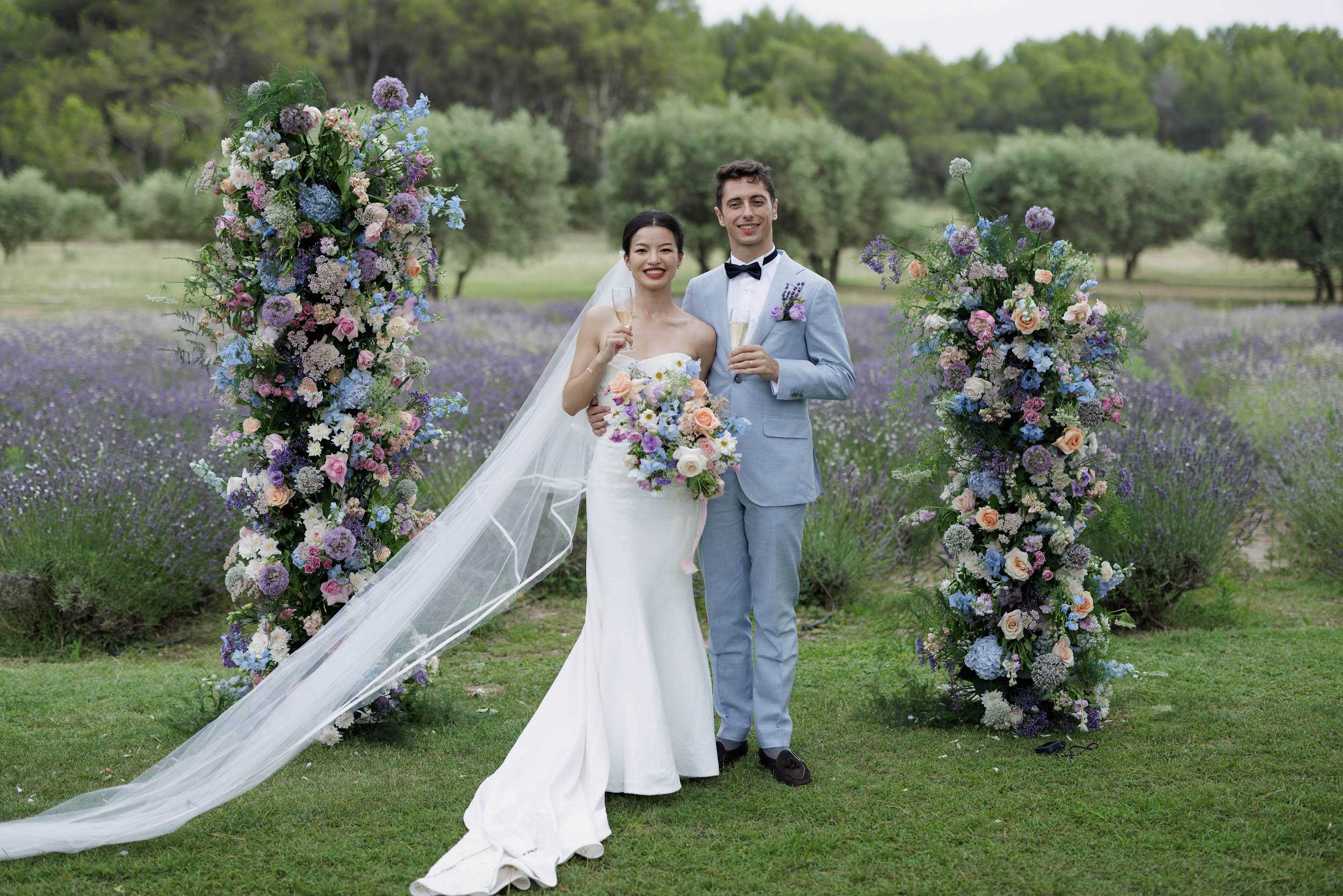
Local Culture and Heritage
Embracing the local culture and heritage can add a touch of authenticity to your wedding experience. Consider venues that reflect the rich history and architectural beauty of France, such as castles, historic estates, or charming village halls. These venues provide a stunning backdrop and a glimpse into the country’s cultural legacy.
What Season to Get Married in the South of France?
The second most stated worry is the weather. It may sound paradoxical, as many would have chosen this country for its sunny climate, but even in the most Southern part of France, it can and it does rain including during the summer months.
Average statistics are good to check before deciding on a location, but they will be of no use on your one and only wedding day. Unfortunately, the weather is one thing that cannot be controlled. So what can you do to avoid worrying that your outdoor ceremony, alfresco drink reception or dinner under the stars may be spoiled by the vagary of the weather? The secret is simple: Have a BACKUP PLAN!
Regional Climate
France has diverse climates due to its geographical location and varying landscapes. The northern regions, such as Paris and Normandy, experience temperate maritime climates with mild summers and cool winters. The southern regions, like Provence and the French Riviera, have a Mediterranean climate characterized by hot summers and mild winters. The central and eastern parts of France, including the Alps, have continental climates with colder winters and warmer summers.
What is the Best Time of Year for a Wedding in France?
The four seasons in France bring distinct weather conditions, each offering its own unique charm. Consider the following:
- Spring (March to mid-June): Spring in France brings milder temperatures, blooming flowers, and lush greenery. However, it can be unpredictable with occasional rain showers. Be prepared for fluctuating weather and have contingency plans in case of inclement conditions.
- Summer (June to mid-September): Summers in France are generally warm to hot, especially in the southern regions. Expect plenty of sunshine, with temperatures ranging from pleasant to sweltering, depending on the location. Keep in mind that popular tourist destinations may be crowded during the peak summer season.
- Autumn (September to mid-December): Autumn offers mild temperatures, beautiful foliage, and fewer crowds. The weather can be relatively stable, although rain showers become more frequent towards November. It’s a great time for weddings in vineyards or picturesque countryside settings.
- Winter (December to mid-March): Winter in France can vary from mild on the Atlantic coast to cold in the northern and eastern regions, and snowy in the mountainous areas. If you’re planning a winter wedding in France, consider venues that offer indoor spaces and plan for potential travel disruptions due to winter weather.
Microclimates
Some regions in France, particularly in mountainous areas or coastal regions, can have microclimates. These microclimates may bring variations in temperature, rainfall, or wind patterns within a relatively small area. Research your specific destination and consult with local experts or wedding planners to understand the microclimate conditions and their potential impact on your wedding day.
How to Ensure an Amazing Guest Experience at your Destination Wedding?
We see brides and grooms concerned about their guests not having a good time. After all, for a destination wedding, they would have to travel and even if this can be seen as a plus, it comes at an additional cost for them (time off and travel). For some less used to getting away, it might take them out of their comfort zone. Nevertheless, they are all prepared to make that effort to witness your happiness, so think about your wedding from your guest’s point of view.
Couples are constantly told that it’s their day and it’s all about what they want. It is right, to a certain extent but on the day, you are not only getting married in France, you are hosting one of the biggest events of your life and your guest’s experience is key to its success.

Source: Ozaria
Clear and Timely Communication
As soon as you decide on a destination wedding in France, communicate the details to your guests in a timely manner. Provide them with essential information such as the wedding date, location, and any pre or post-wedding activities you have planned.
Creating a wedding website is highly recommended as it serves as a central hub for all important information. On the site, provide guests with essential details such as the wedding date, location, and any pre or post-wedding activities you have planned. A wedding website not only ensures that all information is easily accessible but also allows for efficient and streamlined communication with your guests.
Guest Travel Assistance
- Trip Planning Support: Share booking tips, top accommodation options, and travel dates for convenience.
- Regional Recommendations: Offer lists of must-see attractions, dining spots, and experiences in the area.
- Transport Logistics: Arrange shuttles from accommodations to the venue and return to reduce guests’ planning stress.
- Pre-Wedding Activities: Plan group events, like a welcome dinner, wine tasting, or local tour, to help guests settle in and connect.
Essential Comforts
- Good Food & Beverage: Ensure high-quality, diverse meal options and signature cocktails or regional wines.
- Seating & Shade: Ample comfortable seating and shaded areas are crucial for guests’ comfort, especially outdoors.
Memorable Experiences
- Entertainment: Live bands, DJs, or cultural performers can elevate the vibe.
- Personal Interaction: Set aside time to greet guests or hold a welcome toast.
Atmosphere of Joy
- Fun for Newlyweds: When guests see you enjoying the day, it boosts the entire atmosphere, making the event unforgettable.
What Should Be in a Wedding Welcome Bag?
Welcome your guests to France with thoughtful welcome packages. Include personalized notes, maps, local guides, and small gifts that reflect the destination. Consider adding local treats or a bottle of wine to provide a taste of the region’s culinary delights.
French-Inspired Wedding Catering Ideas
One of the highlights of a destination wedding in France is undoubtedly the exceptional cuisine and wine. Curate menus that showcase the best of French gastronomy, incorporating local flavours and delicacies. Click here for some French Inspired Catering Ideas.
Incorporate French Traditions and Culture
Infuse your wedding celebrations with personal touches that reflect your unique relationship and connection to France. Incorporate elements of French culture, such as local music, dance, or décor.
How to Ensure a Seamless Day for the Bride?
Finally, all brides are style-conscious and are keen to look their best on their wedding day. For the destination bride, there are a few challenges along the way, which can make them nervous. Though there are fantastic designers in France, unless doing frequent trips to France, the dress will be chosen in the bride’s country of residence.
Hair and make-up – At best, most brides will only do one trip before the wedding, often earlier on in the planning process when looking at venues or doing menu tastings and won’t go back for trial sessions with the hairdresser and make-up artist.
Pre-Wedding Preparation
Beauty and Hair: Research and book a reputable local hair stylist and makeup artist who specializes in bridal services. Schedule a trial session ahead of time to discuss your desired look and ensure you’re comfortable with their style.
Dress and Accessories: Arrange for your wedding dress to be professionally steamed or pressed before the big day. Pack it carefully in a garment bag and carry it with you as a carry-on during your travel to France.
Wedding Day Timeline and Coordination
Wedding Planner or Coordinator: Hiring a local wedding planner or coordinator can alleviate stress and ensure a smooth flow on your wedding day.
Detailed Schedule: Work with your wedding planner to create a detailed timeline for the wedding day.
Bridal Suite or Getting-Ready Space
Comfortable Accommodation: For the best experience, the bride should get ready directly at the venue. Opt for a bridal suite or a designated getting-ready space that combines comfort and functionality. Ensure it offers ample natural light for makeup application and enough room for you and your bridal party to relax and prepare.
Amenities and Refreshments: Arrange for amenities such as a full-length mirror, steamer, sewing kit, and emergency supplies. Provide a variety of refreshments, such as water, light snacks, and champagne, to keep everyone hydrated and energized.
Vendor Communication
Confirm Details: Before the wedding day, communicate with your vendors, including Celebrants, Photographers, Videographers, and Florists, to reconfirm all the details.
Contact Information: Create a list of important vendor contact information and share it with your maid of honor or a trusted friend.
Relaxation and Self-Care
Prioritize Self-Care: Take time for self-care activities before the wedding to relax and alleviate stress. This could include a massage, meditation, or a stroll in the beautiful French surroundings.
Support System: Surround yourself with a supportive bridal party and loved ones who will help create a positive and uplifting environment.
Delegate Responsibilities
Maid of Honor or Wedding Coordinator: Assign specific responsibilities to your maid of honor or wedding coordinator to ensure the day runs smoothly.
Emergency Kit: Compile an emergency kit that includes essentials like safety pins, stain remover, band-aids, and pain relievers.
Makeup: Since you won’t have a handbag with you, ask a bridesmaid to carry your lipstick for any necessary touch-ups.
Conclusion on Planning a Wedding in France
You are now equipped with the knowledge and inspiration to plan a wedding in France. From selecting the perfect venue to navigating legal requirements and embracing local traditions, you have the tools to create a truly memorable celebration. Let the breathtaking landscapes, rich cultural heritage, and timeless elegance of France serve as the backdrop for your special day. Embrace the charm, savor the cuisine, and immerse yourself in the magic of this beautiful country as you create cherished memories. Your dream wedding in France awaits, and with careful planning, it will be an unforgettable experience for all involved.


